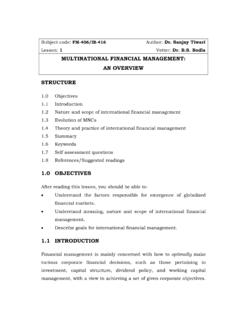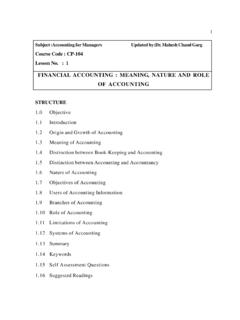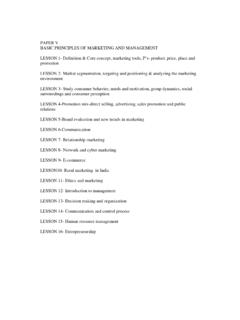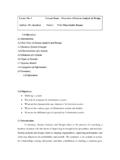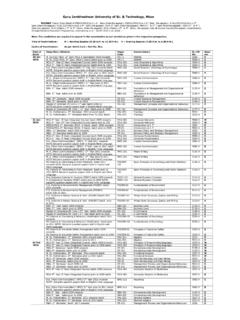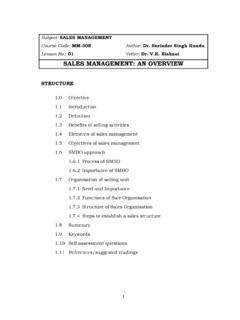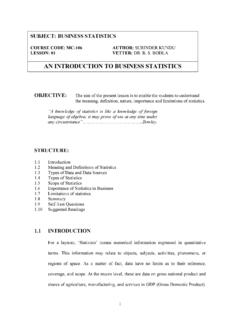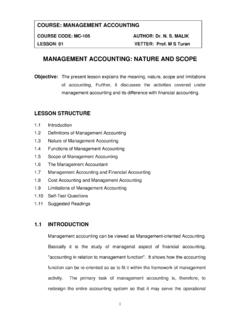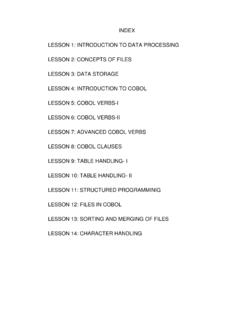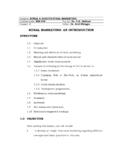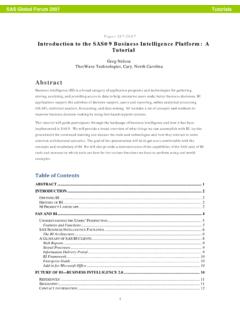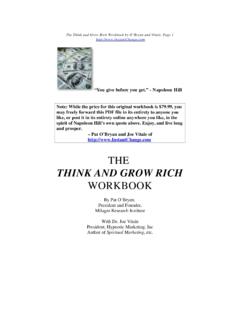Transcription of ENTREPRENEUR AND ENTREPRENEURSHIP
1 Subject: Entrepreneurial Development Code: CP-401 Updated by: Dr. Garg Lesson : 1 ENTREPRENEUR AND ENTREPRENEURSHIP STRUCTURE Objective Introduction Defining ENTREPRENEUR Characteristics of an ENTREPRENEUR Concept of ENTREPRENEURSHIP Characteristics of ENTREPRENEURSHIP Types of entrepreneurs Entrepreneurial Traits ENTREPRENEURSHIP as Career Option Summary Keywords Self Assessment Questions Suggested Readings OBJECTIVE After reading this lesson, you should be able to Understand the meaning of ENTREPRENEUR and ENTREPRENEURSHIP . Explain the characteristics of ENTREPRENEUR and ENTREPRENEURSHIP . Discuss the different types of entrepreneurs .
2 Highlight the entrepreneurial traits. 1 INTRODUCTION The concept of ENTREPRENEURSHIP has been around for a very long time. In the last decade it has resurged as if a new discovery has been made. Usually anyone who runs a business is called an ENTREPRENEUR . The more precise meaning of ENTREPRENEUR is one who creates his own business a person who organizes, operates and assumes the risk of a business venture. An ENTREPRENEUR is a person who perceives a need and then brings together manpower material and capital required to meet that need. The concept of ENTREPRENEURSHIP is an age-old phenomenon that relates to the vision of an ENTREPRENEUR as well as its implementation by him. ENTREPRENEURSHIP is a creative and innovative response to the environment.
3 It is also the process of setting up a new venture by the ENTREPRENEUR . ENTREPRENEURSHIP is a composite skill that is a mixture of many qualities and traits such as imagination, risk-taking, ability to harness factors of production land, labour, technology and various intangible factors. ENTREPRENEURSHIP culture implies a set of values, norms and traits that are conducive to the growth of ENTREPRENEURSHIP . It is the organizational culture that focuses on new opportunities and creation of a set-up where these opportunities can be perused earnestly. An ENTREPRENEUR seeks the opportunities, looks for ways and means to capitalize on the newer opportunities by organizing the structure and the resources and gaining control on them.
4 As against this, a manager in a non- entrepreneurial culture is primarily concerned with the resources under his control, the relation between the market and the 2 structure of his organization. He is also concerned with matching the opportunities with organizational abilities. The entrepreneurial managers are driven by the perception of opportunities. They seek changes in the political rules, social values, consumer preferences, technology etc. On the other hand resources like money, manpower and material they control, drive the administrative managers. DEFINING ENTREPRENEUR The word ENTREPRENEUR is derived from French word ENTREPRENEUR . In early 16th century it was applied to those who were engaged in military expeditions.
5 In 17th century the word ENTREPRENEUR was used for civil engineering activities such as construction and fortification. It was applied to business for the first time in 18th century, to designate a dealer who buys and sells goods at uncertain prices. ENTREPRENEURSHIP started catching up in 1980s just as professionalism in management caught up during 1970s. However, confusion still prevails as to what exactly we mean by the term ENTREPRENEUR . An attempt, therefore, has been made here to define ENTREPRENEUR . There is generally no accepted definition or model of what the ENTREPRENEUR is or does. In the past decade, a number of trends have emerged which distinguish between individual ENTREPRENEURSHIP and corporate ENTREPRENEURSHIP and entrepreneurs and small business owners.
6 The literature abounds with criteria ranging from creativity, innovation, risk taking, high need achievement, etc. to personal traits such as appearance and style. Models of the entrepreneurial leaders are almost as plentiful as the number of authors who write about them. 3 The French economist Cantillon, the first to introduce the term ENTREPRENEUR , defined him as an agent who purchased the means of production for combination into marketable products. Furthermore, at the moment of the factor purchases, the ENTREPRENEUR was unaware of the eventual price which he would receive for his product. entrepreneurs perform a vital function in economic development. They have been referred to as the human agents needed to mobilize capital, to explore natural resources, to create markets and to carry on trade.
7 It might well be said that the entrepreneurial input spells the difference between prosperity and poverty among nations. According to Say, the ENTREPRENEUR s functions to combine the productive factors, to bring them together. Carrying out of new combination of productive factors is called enterprise which, in fact, is fundamental phenomenon of economic development. The individual whose function is to carry them out is ENTREPRENEUR . Many theories in economics emphasize the significant role played by individual entrepreneurs as they combine talents, abilities and drive to transform resources into profitable undertakings. Schumpeter, the first major writer to highlight the human agent in the process of economic development believed that the economy was propelled by the activities of persons who wanted to promote new goods and new methods of production, or to exploit new sources of materials or new market not merely for profit but also for the purpose of creating.
8 Schumpeter used the word innovation and emphasized innovation as the function .of an ENTREPRENEUR . Schumpeter s ENTREPRENEUR is highly specialized concern. The ENTREPRENEUR in 4 Schumpeter s theory sees the potentiality, profitable opportunities and exploits them. The entrepreneurs motivation for profit is based not merely on his desire to raise consumption standard, but also on such non-hedomistic goals as the desire to find a private dynasty- the will to conquer in the competitive battle and the job of creating, he tries to maximize his profits by innovations. His unique characteristic is that he gets satisfaction by using his capabilities in attacking problems. The entire change and development to the civilization to a large extent is the result of trade, commerce and industrialization.
9 In this development the human resource in general and ENTREPRENEUR in particular plays a pivotal role. McClelland has rightly hypothesized that the need for achievement in individuals, the entrepreneurial potential is the psychological factor which engenders economic growth and decline. The sense of high need achievement and motivation introduced by entrepreneurs bring about the required necessities in a class of society which transform the perception of the economic thinking, which is necessary to bring about the economic development. The importance of entrepreneurs to progress cannot be more succinctly expressed than Zinkin s statement, No ENTREPRENEUR , no development . According to Kilby, the ENTREPRENEUR performs following four major tasks: (i) Exchange relationship, (ii) Practical administration, (iii) Management control, and (iv) Technology.
10 These four tasks consist of (1) Exchange relationship 5 (a) Perceiving opportunities in market. (b) Gaining command over scarce resources. (c) Purchasing inputs. (d) Marketing of products and responding to competition. (ii) Practical administration (a) Dealing with public bureaucracy. (b) Management of human relations with in the venture. ( c) Management of customer and supplier relations. (iii) Management Control (a) Financial Management (b) Production Management. (iv) Technology (a) Acquiring and overseeing assembling of the factory. (b) Industrial engineering. (c) Upgrading process and product quality. (d) Introduction of new production techniques and products. All above fields of activities involve ENTREPRENEUR in decision-making under conditions of uncertainty.
